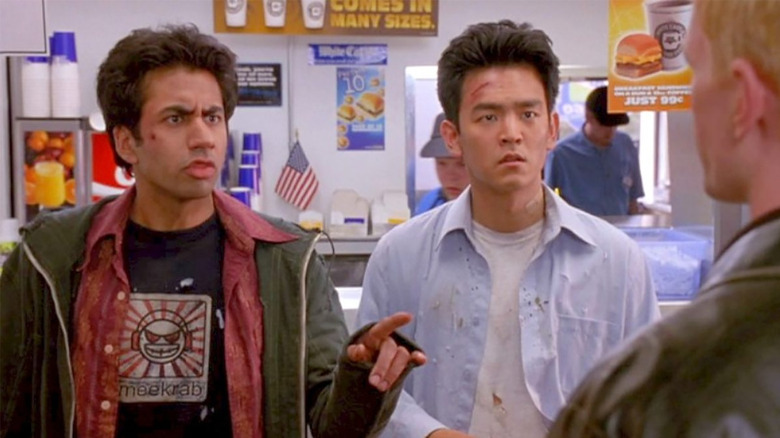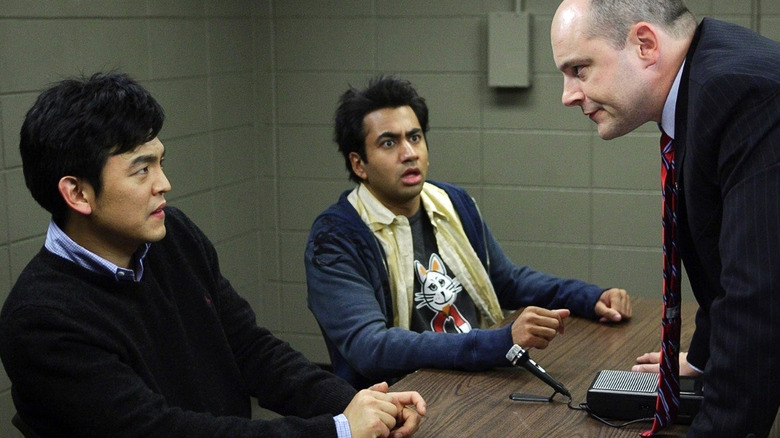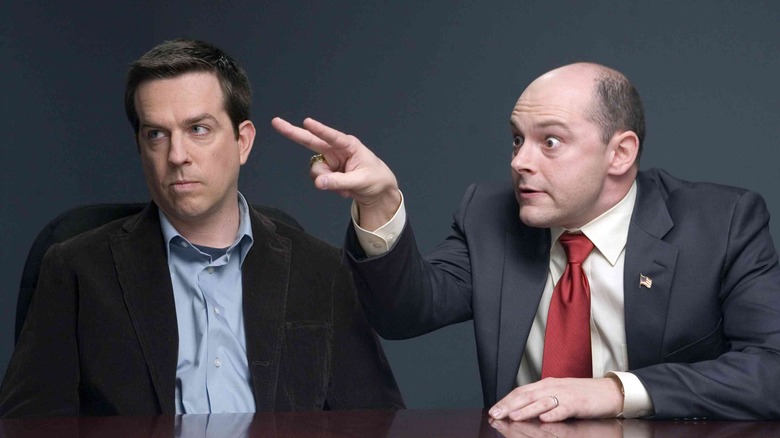Trusting The Audience Was Key To Making Harold And Kumar's Comedy Work
A common sentiment you often hear is the idea that a certain sitcom or comedy film "couldn't have been made today" because of political correctness run amok. You'll often hear these laments being made about shows like "The Office," where Michael Scott (Steve Carell) would constantly say offensive things that wouldn't fly in today's climate, and isn't that a shame?
It's a claim that's easy to counter: "The Office" had a clear resurgence in popularity around 2020-2021, mostly driven by the younger, supposedly more easily offended generation that were too young to enjoy the show when it was actually airing. It's also a claim that shows a fundamental misunderstanding of why "The Office" was funny in the first place. When Michael condescends to a guy in a wheelchair in "The Injury," the joke is that Michael's a terrible person and he's embarrassing himself in front of everyone, not, "Let's laugh at the handicapped person who just got insulted." The show's humor works largely because of how much it trusts the audience to understand that racism, sexism, ableism, etc., is bad. As with any show, there are certain jokes that probably wouldn't be the same today, but nothing about the show's premise or general approach to comedy would be off-limits to modern audiences.
A similar sensibility went behind the production of "Harold & Kumar Go to White Castle," a 2004 film where its two main characters — the Korean-American Harold (John Cho) and Indian-American Kumar (Kal Penn) — are constantly subjected to racial profiling and general racial mistreatment. The racism on display here is often shocking and extreme, but the film is very clear about where it stands on the issue.
Trusting their audience
"When we start to write, we're under the assumption that everyone knows racism is bad," writer and director Hayden Schlossberg explained to The New York Times. "Harold and Kumar's attitude toward racism is more frustration at having to deal with idiocy than moral outrage. We try to create a world where racism is stupid."
John Cho explained further, "It's not an exact science, making laughs out of this kind of stuff, but I think there's a desire on the part of the audience to, if not discuss race, at least laugh about it."
This attitude can be best seen in the first two movies, where most of the plot involves the two main characters getting into trouble thanks to the efforts of absurdly dumb and racist groups of policemen and federal agents. The racial profiling in "Harold & Kumar Escape from Guantanamo Bay" takes things to even more of an extreme: there's one part where the Homeland Security official Ron Fox (Rob Corddry) takes one look at Harold and Kumar and comes to the conclusion that North Korea and Al-Qaeda have joined forces, and these two are both agents for them. He later tries to interrogate a Black man by pouring out a can of grape soda in front of him, expecting the guy to break and tell him the truth just to get a taste of said grape soda. (Needless to say, the strategy didn't pan out.)
Providing catharsis
Perhaps the most egregious example comes when Ron Fox and his equally incompetent translator (played by Ed Helms) are trying to interrogate Harold and Kumar's parents. The four parents are trying to explain that Harold and Kumar aren't terrorists, but the interrogators are so tunnel-visioned that they aren't really listening to a thing they're saying. Actually, that's underselling it: they literally cannot understand the words coming out of the parents' mouths. "Look," Harold's father says at one point, in perfect English, "We've been American citizens for over 40 years now. Frankly, I find this very offensive." In response, Ed Helms' character looks over to Fox and says, perplexed, "They're using some sort of dialect I've never heard before, but I'm pretty sure he said something about going on the offensive."
It was the self-defeating stupidity in the scene with the parents, as well as the early conflict in the movie between Kumar and the TSA agent, that was most connected to the writers' real-life struggles with racial profiling. When talking about his real-life troubles with post 9/11 air travel, Kal Penn explained:
"Once we were with a friend of mine ... he's the same age, same height as me, except he's white ... I was stopped at security, but he went through even though he had a hunting knife that he forgot to take out of his backpack. They were so focused on pulling out the brown guy, they didn't even notice."
The humor in the "Harold & Kumar" movies doesn't just age well because of how clearly critical of racism it is, but because of the catharsis it provides to anyone who's had to put up with this sort of racism in real life. At a time where so many 2000s-era comedies have aged poorly, it's not a surprise that the "Harold & Kumar" franchise remains beloved.


